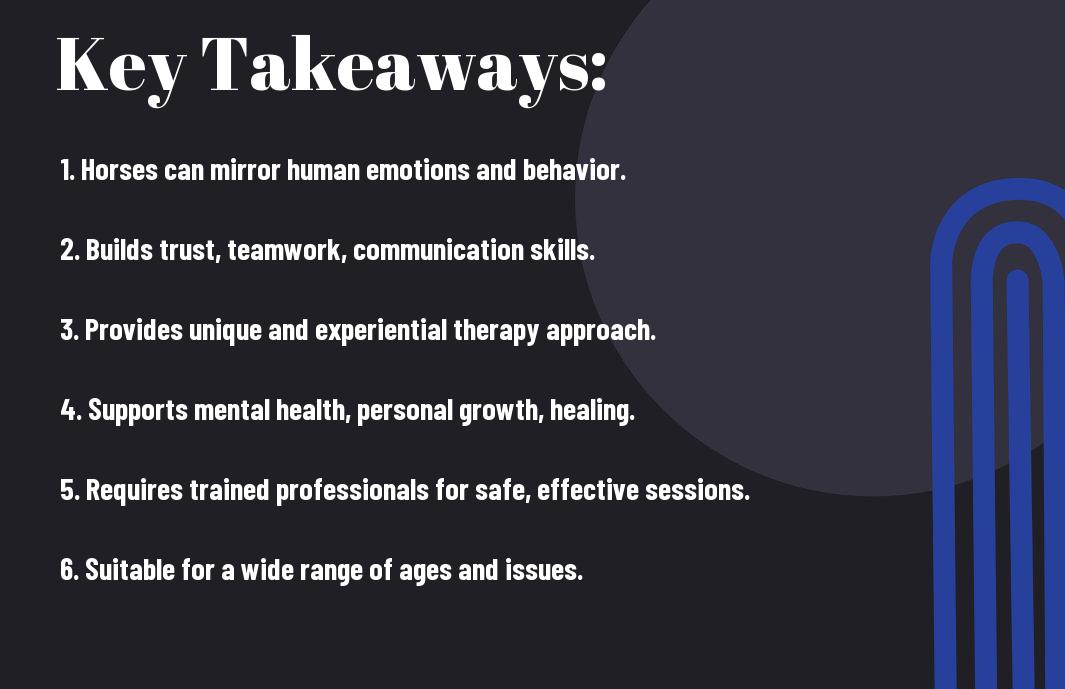Psychotherapy can take on many forms, including one that involves our four-legged friends. As you examine the world of Equine Assisted Psychotherapy, you’ll discover the powerful bond between humans and horses and how it can positively impact your mental well-being. From building trust and communication to gaining self-awareness and emotional regulation, this unique therapeutic approach can offer you a safe space for healing and growth. Explore the transformative potential of equine therapy and begin on a journey towards a healthier, happier you.


Defining Equine Assisted Psychotherapy
To truly understand Equine Assisted Psychotherapy, you must research into its origins and history, as well as grasp the key principles and concepts that underpin this unique form of therapy.
Origins and History
On your journey to explore Equine Assisted Psychotherapy, it’s necessary to consider its origins and history. The roots of this therapeutic approach can be traced back to the ancient Greeks, who recognized the healing power of horses. In modern times, Equine Assisted Psychotherapy gained popularity in the 20th century, particularly in the field of mental health treatment.
Key Principles and Concepts
Psychotherapy integrated with equine interactions focuses on the inherent connection between humans and horses. The non-verbal communication, trust-building, and challenges presented during equine sessions mirror real-life situations, providing valuable insights into your own behavior and emotions.
Understanding the key principles and concepts of Equine Assisted Psychotherapy can be transformative, as it offers a unique opportunity to address emotional issues, build self-awareness, and develop crucial life skills through interactions with these magnificent animals.
The Science Behind EAP
Neurobiological Effects of Horse-Human Interaction
One of the fascinating aspects of Equine Assisted Psychotherapy (EAP) is the neurobiological effects of the interaction between horses and humans. Research has shown that being around horses can lower levels of the stress hormone cortisol and increase the release of oxytocin, known as the bonding hormone. This hormonal shift can lead to a sense of calmness and connection, helping individuals open up and engage more effectively in therapy.
Emotional Regulation and Attachment Theory
Regulation is key in understanding how EAP can benefit individuals struggling with emotional issues. Attachment theory suggests that our early interactions with caregivers shape how we relate to others and regulate our emotions. Working with horses can provide a nonjudgmental environment for individuals to explore and improve their emotional regulation skills. Horses are highly attuned to human emotions and can reflect back our feelings, helping us become more aware of and regulate our emotional responses.
It is important to note that developing healthy attachment patterns and improving emotional regulation can have long-lasting positive effects on your relationships and overall well-being. By engaging in EAP, you have the opportunity to work through past traumas, build resilience, and develop healthier ways of relating to yourself and others.
Therapeutic Benefits of EAP
All the verbalizing you do with your therapist might not be as effective as you hope. That’s where Equine Assisted Psychotherapy (EAP) steps in. Reduction of anxiety and stress is a significant benefit of EAP. Horses have a unique ability to mirror your emotions, which can help you better understand and regulate your feelings. Being around these gentle giants can have a calming effect on you, lowering your stress levels and promoting a sense of peace.
Building Trust and Confidence
On your journey in EAP, you will find that building trust and confidence is a key outcome. Working with horses requires establishing a bond based on trust and respect. By interacting with these perceptive animals, you can learn to trust yourself and others more. As you successfully communicate with the horse and navigate obstacles together, you will gain confidence in your abilities.
Confidence is crucial for personal growth and success in various aspects of your life. The experience of earning a horse’s trust and forming a connection can be incredibly empowering. This newfound confidence can translate into improved self-esteem and resilience in facing challenges.
Improving Communication Skills
Therapeutic benefits of EAP extend to improving your communication skills. Horses rely on nonverbal cues and body language to understand and respond to their environment. Through interactions with horses, you can enhance your nonverbal communication skills, become more aware of your body language, and learn how to convey your emotions effectively. This can translate into improved communication in your personal and professional relationships, leading to better understanding and connection with others.

EAP in Practice
Despite its growing popularity, Equine Assisted Psychotherapy (EAP) is still a relatively new form of therapy. Sessions are typically held outdoors, allowing you to connect with the horses and nature while working through emotional challenges. The session structure and facilitation can vary depending on the therapist and the goals you want to achieve.
Session Structure and Facilitation
Session structure in EAP is flexible, with activities involving horses designed to encourage self-reflection and emotional growth. The therapist may ask you to groom, lead, or even ride a horse as part of the therapy. The interaction with the horses can reveal subconscious patterns of behavior and emotions, providing valuable insights into your inner world. The facilitator’s role is to guide you through these experiences and help you process and make sense of your feelings.
Working with Different Populations (e.g., Children, Veterans)
One of the unique aspects of EAP is its effectiveness in working with diverse populations, including children and veterans. Children often respond well to the presence of horses, which can help them express their emotions and build trust with the therapist. Veterans dealing with trauma find solace in the non-judgmental and calming nature of horses, facilitating their healing process.
Understanding the specific needs and challenges of different populations is crucial for tailoring EAP sessions effectively. Therapists trained in equine-assisted approaches can customize activities and interventions to address the unique circumstances of each client, ensuring a therapeutic experience that is both safe and beneficial.
Overcoming Challenges and Limitations
Any form of therapy has its challenges and limitations, and EAP is no exception. Factors such as weather, unpredictability of horses, and client resistance can impact the effectiveness of sessions. Therapists need to adapt and be flexible in their approach, finding creative ways to overcome these obstacles while keeping the focus on the therapeutic process.
For instance, if a client has a fear of horses or is unable to physically interact with them, the therapist can introduce alternative activities that still promote emotional healing and growth. By being attentive to the unique needs of each individual, therapists can navigate challenges and create a safe space for transformative experiences in EAP.
The Role of the Horse in EAP
Horse Temperament and Selection
Keep in mind that the temperament of the horse plays a crucial role in Equine Assisted Psychotherapy (EAP). Horses chosen for therapy sessions are carefully selected for their gentle and calm demeanor. The selection process ensures that the horses used in EAP can provide a safe and supportive environment for participants to engage in therapeutic activities.
Horse-Human Bonding and Empathy
Selection of the right horse involves considering the potential for bonding and empathy between the horse and the participants. Horses have a remarkable ability to sense human emotions and respond accordingly, making them ideal partners in therapy. The bond that forms between the horse and the individual can be a powerful facilitator of emotional healing and personal growth.
Understanding how horses mirror and respond to human emotions is a key aspect of Equine Assisted Psychotherapy. Horses can pick up on subtle cues from individuals, reflecting their emotional state back to them. This mirroring effect often helps individuals become more aware of their own emotions and behaviors, leading to insights and breakthroughs in therapy sessions.
Horse Behavior as a Reflection of Human Emotions
Horse behavior can serve as a mirror for human emotions in Equine Assisted Psychotherapy. When working with horses, pay attention to how they react and respond to your presence and emotional cues. Their reactions can provide valuable feedback and insights into your own emotional state, helping you to explore and address underlying issues in a safe and supportive setting.
To fully benefit from Equine Assisted Psychotherapy, it’s vital to embrace the role of the horse as a therapeutic partner in the process. By developing a strong connection with the horse, you can tap into their intuitive nature and leverage their mirror-like quality to gain deeper insights into your own emotions and behavior patterns. The unique bond formed between humans and horses in EAP can pave the way for profound healing and personal transformation.

Training and Certification for EAP Practitioners
Once again, if you are considering a career in Equine Assisted Psychotherapy (EAP), it is crucial to understand the training and certification requirements for practitioners in this field.
Essential Skills and Knowledge
Training in EAP equips you with the necessary skills to work effectively with both horses and clients. It is crucial to have a solid understanding of equine behavior, herd dynamics, and non-verbal communication. Additionally, knowledge of mental health practices and counseling techniques is vital to support clients through their therapeutic journey in a safe and productive manner.
Certification Programs and Professional Development
An EAP certification demonstrates your commitment to professionalism and quality standards in this specialized field. Certification programs typically involve a combination of practical experience, supervision, coursework, and examinations to ensure that practitioners meet the highest standards of competence. Continued professional development is also key to staying current with best practices and ethical guidelines in EAP.
Understanding the importance of certification programs and ongoing professional development is crucial for EAP practitioners to maintain the highest standards of care and professionalism in their practice. By investing in your education and training, you not only enhance your skills but also build trust and credibility with clients and other healthcare professionals.
Ethics and Boundaries in EAP Practice
An understanding of ethics and boundaries is paramount in EAP practice to ensure the well-being of both clients and equine partners. It is crucial to establish clear boundaries, maintain confidentiality, and uphold ethical standards in all interactions. Practitioners must also have a deep respect for the autonomy and welfare of the horses involved in therapy sessions.
Boundaries are the cornerstone of ethical EAP practice, safeguarding the integrity of the therapeutic process and relationships involved. By maintaining strong ethical boundaries, you create a safe and trusting environment for clients to explore their issues and work towards positive change with the support of the horses.
Summing up
Conclusively, exploring equine assisted psychotherapy can be a transformative experience for both clients and therapists alike. By engaging with horses in a therapeutic setting, you can tap into your emotions, develop self-awareness, and gain valuable insights into your own patterns of behavior. The unique bond that forms between humans and horses can facilitate healing and growth in ways that traditional talk therapy might not always achieve.
Q: What is Equine Assisted Psychotherapy (EAP)?
A: Equine Assisted Psychotherapy is a form of experiential therapy that involves interaction between patients and horses to address emotional and mental health issues.
Q: How does Equine Assisted Psychotherapy work?
A: In EAP, patients work with horses on the ground, engaging in various activities and tasks that help them explore their emotions, behaviors, and patterns in a non-judgmental and supportive environment.
Q: What are the benefits of Equine Assisted Psychotherapy?
A: Some benefits of EAP include improved self-awareness, emotional regulation, communication skills, increased confidence, and the development of trust and empathy.
Q: Who can benefit from Equine Assisted Psychotherapy?
A: EAP can benefit individuals of all ages, especially those struggling with trauma, anxiety, depression, PTSD, addiction, relationship issues, and other mental health challenges.
Q: Is prior experience with horses required for Equine Assisted Psychotherapy?
A: No prior experience with horses is necessary for participating in Equine Assisted Psychotherapy. The focus is on the therapeutic relationship and the interactions between the patient and the horse.











